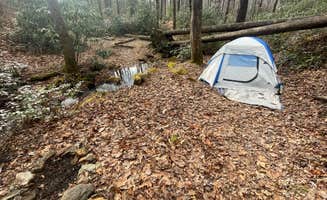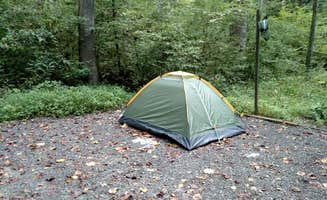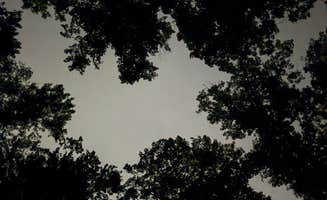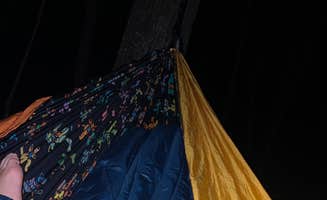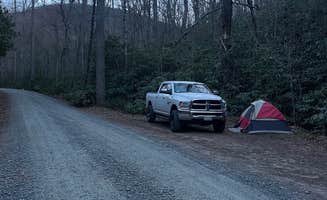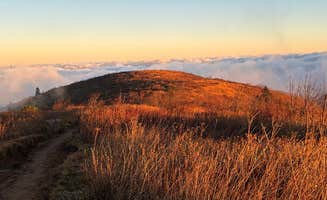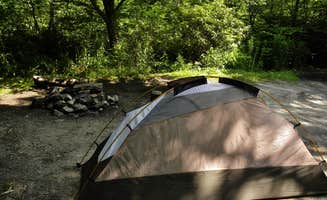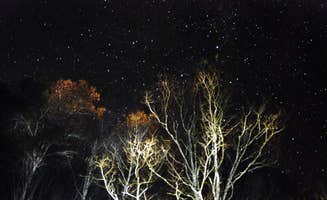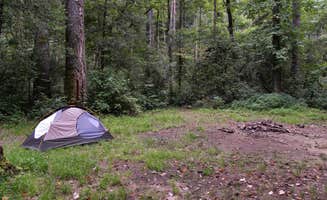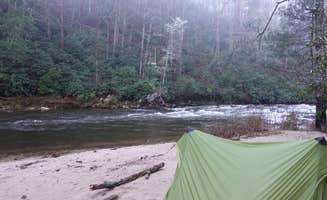Dispersed camping near Greer, South Carolina offers primitive overnight accommodations throughout Pisgah National Forest's diverse elevations, which range from 2,000 to 6,000+ feet. Temperature variations can exceed 10-15 degrees between valley floors and mountain peaks, creating distinct camping microclimates. Forest service roads typically close during winter months, particularly after snowfall or ice storms.
What to do
Waterfall exploration: 3.2 miles from Blue Ridge Roadside Campsites, campers can visit Sunburst Falls by hiking down a steep embankment for optimal views. A reviewer mentioned "to get the best view, you have to hike down a steep embankment" to fully appreciate this natural feature.
Creek access: Many sites permit direct water access for cooling off or ambient sound. At Wash Creek Dispersed Pull-Off, "there's a stream that runs along the clearing, making some great natural white noise for sleeping," according to a recent visitor who appreciated the soundscape benefits.
Night sky viewing: The minimal light pollution at several sites provides exceptional stargazing opportunities. One camper at Wash Creek Dispersed Pull-Off noted, "Very low light pollution and the bare trees allowed for some great star gazing," making it ideal for astronomy enthusiasts.
Trail connections: Many dispersed sites connect to established hiking networks. At Mountain Rest Mountain Top, campers can access "a trail down to creek and near a second trail to a waterfall," giving direct access to natural features without driving.
What campers like
Mountain-top isolation: Higher elevation sites provide both views and privacy. At Black Balsam Knob, campers report exceptional cloud viewing opportunities where "the clouds are amazing you are basically in them or above them."
Water features: Streams run adjacent to many sites, enhancing the camping experience. A visitor to Henderson Reservoir Dispersed Site #1 simply noted it was "clean and large" with a "creek below," providing natural water access without walking far from camp.
Seasonal variation: Spring and fall bring fewer crowds to most sites. A Mountain Rest Mountain Top reviewer found "evenings were totally quiet" despite "a few people during the day," indicating better solitude outside peak summer months.
Forest canopy: The dense tree cover at lower elevation sites provides natural shade and reduced wind exposure. At Upper Cove Creek UCC1, campers appreciate being "remote" while having "clearly marked spots" that blend into the forest setting.
What you should know
Vehicle requirements: Many access roads present challenges for standard passenger cars. Mountain Rest Mountain Top requires "slow and steady" driving as the road is "narrow and very bumpy" with a reviewer specifically noting "4x4 recommended but I made it down in a 2x4 fullsize pickup."
Security concerns: Some areas report theft issues. At Mills River Dispersed, visitors warn of problems with "a long term camper they refuse to run off and he will steal from you," suggesting campers should "watch your stuff like a hawk."
Cell coverage: Most sites have zero connectivity. At 475b, there's no mention of service availability, while other nearby sites explicitly note complete disconnection from networks, requiring driving 10+ minutes to regain signal.
Seasonal road closures: Winter access becomes limited or impossible at higher elevations. One camper at Blue Ridge Roadside noted encountering "roads closed off due to weather," forcing adjustments to camping plans.
Tips for camping with families
Fire preparation: Bring your own firewood or collection tools for most sites. At Mountain Rest Mountain Top, a camper found "hundreds of downed trees" that were "chopped up, perfect for a firering," though availability varies seasonally.
Day-use traffic: Be prepared for hikers passing through during daylight hours. At Black Balsam Knob, "a lot of day hikers" pass through throughout the day, making sites near trailheads less private during peak hours.
Weather awareness: Mountain weather changes rapidly and varies by elevation. A Black Balsam Knob camper warned "the wind is no joke" with "wind gusts that are capable of snapping tent poles" at exposed sites, requiring proper equipment and setup techniques.
Local knowledge: Some sites are difficult to locate without specific directions. One Blue Ridge Roadside camper "spent 20 minutes trying to find this campground from where the GPS took us" and "never found it," highlighting navigation challenges.
Tips from RVers
Site access limitations: Most dispersed areas accommodate only smaller rigs with appropriate clearance. At Upper Cove Creek UCC2, one RVer managed to navigate "down the road in a 30' class A motorhome and made a 180 and was able to level the rig no problem," but noted this isn't typical.
Leveling challenges: Bring appropriate leveling equipment for uneven terrain. The UCC2 camper mentioned finding a spot "well off the road" where leveling was possible, though most sites lack formal parking pads.
Traffic patterns: Be aware of forest road use timing when selecting sites. At UCC2, campers noted "a lot of back and forth traffic in the morning but it dies down around 9 pm" due to connections with other service roads and recreation areas.


